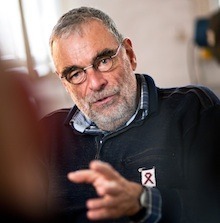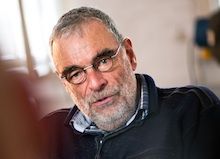Tonight, ARD is broadcasting the fine television documentary "The AIDS War" (23:15-0:00). It recalls the beginnings of HIV in Germany, the political and social debates and the start of the self-help movement. Watch it!

As far back as we can look in the history of medicine, war metaphors have been used in the fight against diseases and epidemics: People fought against pathogens and germs, declared war on tuberculosis and syphilis. The roles of friend and foe were always clearly defined.
Thirty years ago, a new war begins against a new, previously unknown virus. This time, however, the enemy is not only the deadly virus, but also its carriers. The battle zone reaches deep into society and shakes it to its very foundations. "We were afraid of a pogrom atmosphere," recalls Munich gay activist Guido Vael.
The WDR television documentary "The AIDS War" is an impressive reminder that this is not a hysterical exaggeration, but actually describes the social climate in the mid-1980s. It interweaves interviews with contemporary witnesses with archive footage, photos and private films.
Time travel through the social debates of the first years with AIDS
Anyone who consciously followed the first years of the epidemic in Germany will experience many a flashback in this thoroughly researched documentary. Film author Jobst Knigge revisits the most important milestones as if in staccato: the first reports of the mysterious epidemic appeared in the USA in 1981, and the first cases were registered in Germany the following year.

The media, especially Der Spiegel, are fuelling fear and mistrust among the population. The mood of panic leads to reactions in politics that have not been imaginable since the end of fascism in Germany. The Bavarian Minister of Culture, Hans Zehetmair, for example, freely describes homosexuality as "unnatural" on television and pleads for "thinning out these fringes of society" in order to protect the "healthy majority of the people". And the Bavarian State Chancellery is openly discussing the dismantling of the gay subculture. The AIDS and homosexual activist Guido Vael reports in this documentary, for example, that in Munich the AIDS organisation was banned from distributing condoms in trendy bars. The reason given was that it was in breach of the law on shop closures.
But AIDS has long been more than just a "gay epidemic". The fear of being stigmatised weighs heavily on people infected with HIV, regardless of their sexual orientation. The Niemeyer couple concealed their HIV infection for almost two decades, even from their children, because they feared the reactions of their fellow men. And actress Jessica Stockmann had to promise her partner, ex-tennis pro Michael Westphal, on his deathbed that she would keep quiet about the true cause of his death for ten years.
It was a cultural struggle with an uncertain outcome
This 45-minute documentary makes two things clear once again: firstly, how much this panic was primarily a media product, and secondly, how fiercely and on a knife's edge the resulting culture war was fought. Forced testing, forced isolation, compulsory reporting by name and even the state-ordered tattooing of HIV-positive people were discussed. Should the "strong state" crack down, or should we rely on the principle of prevention through education?
Jobst Knigge has brought the main advocates of these two opposing attitudes in front of the camera: the former Munich State Councillor and later Bavarian State Secretary Peter Gauweiler (CSU) and the former Health Minister Rita Süssmuth (CDU). It is astonishing how open-hearted Gauweiler still is about his politics 30 years later and expresses his disgust towards gays and their "cock-driven public pleasure".
In the interview, Süssmuth emphasises just how explosive AIDS had become in terms of domestic politics at the time. She was certain that the AIDS debate would decide the 1987 Bundestag elections. "The debate was so heated that we didn't know whether we would win this battle." Süssmuth therefore invited international scientists to a secret meeting at the Federal Chancellery. She hoped that this support would convince the cabinet that prevention was the right way to respond to the epidemic. Her strategy was successful. The political culture war was won for the time being, but the war was by no means over.
The volunteer helpers in the care centres often had little more to do than hold the hands of the dying, says doctor Dietmar Schranz. Archive footage from the mid-1980s shows the then medical student as a volunteer in Aids care. Time and again, the nursing staff refused to treat the patients, recalls Gerd Paul, co-founder of the Berlin Aids-Hilfe organisation. "It was a very personal, deep-seated indignation" that led him to become politically active for the first time in his life.
Text: Axel Schock
"The AIDS war" by Jobst Knigge. Interview partners include Bernd Aretz, Gerd Paul, Jessica Stockmann, Peter Gauweiler, Rita Süssmuth, Dietmar Schranz, Matthias Frings, Almut and Heinz-Dieter Niemeyer.
TV broadcasts: Das Erste, 16 Nov., 11.15 p.m.; WDR Fernsehen, 25 Nov., 11.15 p.m.; Phoenix, 1 Dec., 6.30 p.m.










